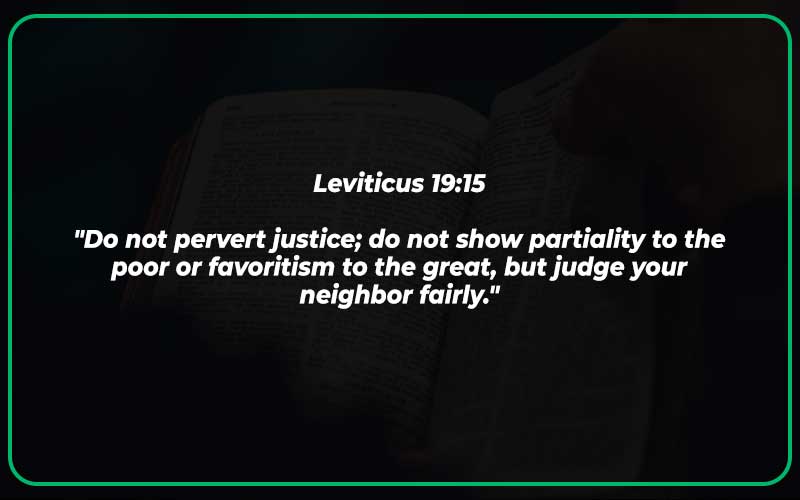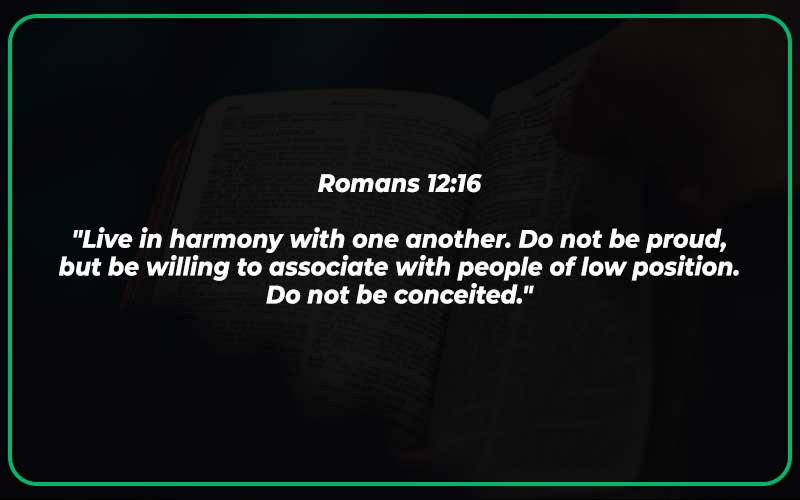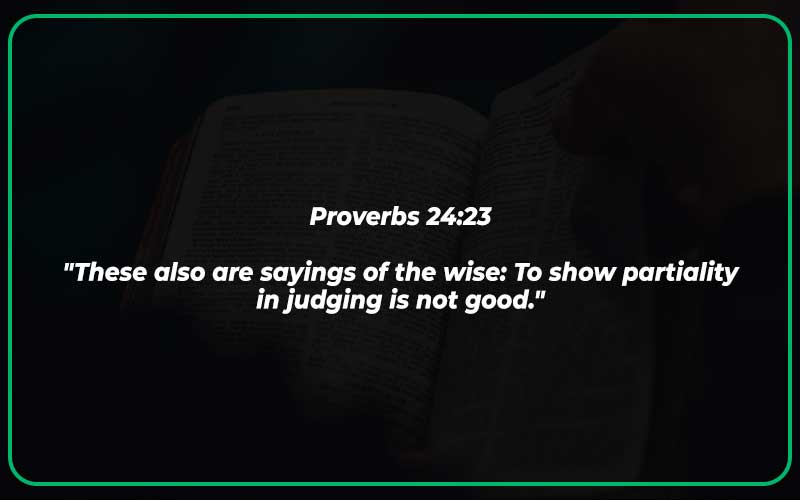In a world that often judges and treats people based on appearances, favoritism can rear its ugly head, sowing discord, and inequality in our communities and relationships.
As followers of the teachings of the Bible, it’s essential for us to examine what the scriptures say about favoritism and how we can strive to overcome this harmful bias. In this post, we will delve into key Bible verses that address favoritism, uncover lessons from Bible stories, and learn how we can overcome favoritism through faith.
Understanding Favoritism
Favoritism, at its core, is the act of showing preference or partiality to certain individuals or groups based on personal biases, rather than objective criteria. This can manifest in various settings, from family dynamics to workplaces and even within religious congregations. The Bible warns us against favoritism and its destructive impact on relationships and societal harmony.
Bible Verses about Favoritism
James 2:1
“My brothers and sisters, believers in our glorious Lord Jesus Christ must not show favoritism.”
Believers are called to reject favoritism in all its forms. Regardless of social status or wealth, Christians are to treat all individuals with equal love and respect, as Jesus taught.
Leviticus 19:15
“Do not pervert justice; do not show partiality to the poor or favoritism to the great, but judge your neighbor fairly.”
God emphasizes the importance of impartiality in the pursuit of justice. Regardless of one’s status, all individuals deserve fair judgment and treatment. Showing favoritism based on wealth or social standing distorts the true meaning of justice.

Proverbs 28:21
“To show partiality is not good—yet a person will do wrong for a piece of bread.”
This verse highlights the detrimental nature of favoritism. It warns against compromising one’s integrity for personal gain or material possessions, emphasizing that showing partiality goes against the principles of goodness and righteousness.
Romans 2:11
“For God does not show favoritism.”
God is impartial and just. He does not favor one person over another based on external factors such as wealth or social status. In His eyes, all individuals are equal and equally deserving of His love and grace.
Also Read: 25 Bible Verses about Respecting Your Elders (With Commentary)
Acts 10:34-35
“Then Peter began to speak: ‘I now realize how true it is that God does not show favoritism but accepts from every nation the one who fears him and does what is right.'”
Peter’s revelation reflects the inclusive nature of God’s love. Regardless of nationality or background, God welcomes and accepts all who sincerely seek Him and strive to do what is right. He does not discriminate based on external factors but looks at the heart.
Deuteronomy 10:17
“For the Lord your God is God of gods and Lord of lords, the great God, mighty and awesome, who shows no partiality and accepts no bribes.”
This verse underscores the absolute sovereignty and righteousness of God. He is above all and shows no partiality or bias. God cannot be swayed by bribes or influenced by external factors. His judgments are just and impartial.
Colossians 3:25
“Anyone who does wrong will be repaid for their wrongs, and there is no favoritism.”
God’s justice is impartial and unwavering. Those who commit wrongdoing will face the consequences, regardless of their social status or any preferential treatment they may have received in the world. In God’s eyes, there is no favoritism when it comes to accountability.
Ephesians 6:9
“And masters, treat your slaves in the same way. Do not threaten them, since you know that he who is both their Master and yours is in heaven, and there is no favoritism with him.”
This verse addresses the issue of favoritism in the context of slavery. Masters are reminded to treat their slaves justly and without threats, recognizing that God, the ultimate Master, shows no favoritism. Every individual, regardless of their social standing, holds equal value and worth in God’s eyes.
Job 34:19
“who shows no partiality to princes and does not favor the rich over the poor, for they are all the work of his hands?”
God’s impartiality extends to all, irrespective of their societal positions. He does not show favoritism to the wealthy or powerful, nor does He overlook the needs and struggles of the poor. Every person is uniquely crafted by God, deserving of equal love and compassion.
1 Timothy 5:21
“I charge you, in the sight of God and Christ Jesus and the elect angels, to keep these instructions without partiality, and to do nothing out of favoritism.”
This verse emphasizes the importance of impartiality in carrying out God’s instructions. Believers are called to uphold God’s commandments without partiality or favoritism. Our actions and decisions should be guided by justice and righteousness, rather than personal preferences.
Galatians 2:6
“As for those who were held in high esteem—whatever they were makes no difference to me; God does not show favoritism—they added nothing to my message.”
In the proclamation of the Gospel, Paul emphasizes that personal stature or reputation holds no significance. God’s impartiality ensures that no one’s position of influence can add or subtract from the essential message of salvation. The truth of God’s love and grace remains unaltered by human favoritism.
Job 13:10
“He would surely call you to account if you secretly showed partiality.”
This verse reminds us that God is aware of our actions, even those done in secret. If we engage in favoritism covertly, thinking we can escape accountability, we are mistaken. God’s justice is all-encompassing, and He calls us to be honest, fair, and devoid of partiality.
Matthew 22:16
“Teacher, we know that you are a man of integrity and that you teach the way of God in accordance with the truth. You aren’t swayed by others because you pay no attention to who they are.”
Jesus is commended for His unwavering integrity and impartiality. He teaches the truth of God without being influenced by the social status or prominence of individuals. This serves as a powerful example for us to follow, demonstrating that we should prioritize truth and righteousness over favoritism.
Exodus 23:3
“Do not show favoritism to a poor person in a lawsuit.”
This verse emphasizes the importance of fair judgment and impartiality, even in legal proceedings. While it may be tempting to show favoritism towards the poor, God’s command instructs us to judge based on the merits of the case rather than the socioeconomic status of those involved. Justice should prevail over partiality.
1 Samuel 16:7
“But the Lord said to Samuel, ‘Do not consider his appearance or his height, for I have rejected him. The Lord does not look at the things people look at. People look at the outward appearance, but the Lord looks at the heart.'”
When choosing David as the future king, God reminds Samuel that He does not judge based on outward appearances. Unlike humans who may be swayed by physical attractiveness or external factors, God sees the true intentions and character of individuals. This verse reinforces the importance of looking beyond superficial attributes and avoiding favoritism.
Romans 12:16
“Live in harmony with one another. Do not be proud, but be willing to associate with people of low position. Do not be conceited.”
This verse encourages believers to foster unity and harmony within the community of faith. It cautions against pride and encourages the association with individuals of low position. By treating everyone with humility and respect, we demonstrate God’s love and break down the barriers that favoritism can create.

Luke 14:12-14
“Then Jesus said to his host, ‘When you give a luncheon or dinner, do not invite your friends, your brothers or sisters, your relatives, or your rich neighbors; if you do, they may invite you back and so you will be repaid. But when you give a banquet, invite the poor, the crippled, the lame, the blind, and you will be blessed. Although they cannot repay you, you will be repaid at the resurrection of the righteous.'”
Jesus teaches us to go beyond societal norms and expectations. Rather than showing favoritism by inviting only those who can reciprocate our kindness, we are called to extend hospitality to the marginalized and disadvantaged. Such acts of selfless love bring blessings and reflect the heart of God.
Job 36:5
“God is mighty, but despises no one; he is mighty, and firm in his purpose.”
This verse reveals God’s mighty power and unwavering purpose. Despite His immense strength, He does not despise or show favoritism towards anyone. God’s love is inclusive, encompassing all individuals without partiality. This reminds us to align our hearts with His and reject favoritism in all its forms.
Romans 9:14
“What then shall we say? Is God unjust? Not at all!”
Paul addresses the question of God’s justice, highlighting that God’s ways are beyond human comprehension. He reassures believers that God’s actions are always just and fair, devoid of favoritism. While our limited understanding may lead us to question, we can trust in the righteousness of God’s character.
Matthew 19:30
“But many who are first will be last, and many who are last will be first.”
Jesus overturns the world’s perspective on status and favoritism. In God’s kingdom, the hierarchy is inverted. Those who may be esteemed as first in the eyes of society may find themselves last in God’s evaluation, while those who are considered last may be lifted to first position. This challenges us to reevaluate our own biases and embrace God’s impartial perspective.
Psalm 82:2-4
“How long will you defend the unjust and show partiality to the wicked? Defend the weak and the fatherless; uphold the cause of the poor and the oppressed. Rescue the weak and the needy; deliver them from the hand of the wicked.”
This passage highlights God’s call for justice and care for the vulnerable. It confronts those who show favoritism towards the wicked and encourages the defense of the weak, fatherless, poor, and oppressed. God’s heart beats for justice, mercy, and impartiality, and we are called to reflect His character in our actions.
Galatians 3:28
“There is neither Jew nor Gentile, neither slave nor free, nor is there male and female, for you are all one in Christ Jesus.”
In Christ, all divisions and distinctions are abolished. Favoritism based on ethnicity, social status, or gender is nullified. The unity we have in Jesus transcends any human-made categories, emphasizing the equal worth and value of all individuals. This truth challenges us to eradicate favoritism and embrace the unity we have in Christ.
1 Peter 1:17
“Since you call on a Father who judges each person’s work impartially, live out your time as foreigners here in reverent fear.”
As children of God, we are reminded that our Heavenly Father judges with impartiality. Knowing this, we are called to live as foreigners in this world, free from the grip of favoritism. Our conduct should be marked by reverence and an awareness that our actions and treatment of others should mirror God’s impartiality and grace.
Also Read: 25 Bible Verses About Atheism (With Commentary)
2 Chronicles 19:7
“Now let the fear of the Lord be on you. Judge carefully, for with the Lord our God there is no injustice or partiality or bribery.”
This verse emphasizes the importance of fearing the Lord and conducting fair judgment. It underscores that God is just, without any injustice, partiality, or bribery. As we make decisions and judgments, we are called to reflect His character by being fair, unbiased, and free from corruption.
Proverbs 24:23
“These also are sayings of the wise: To show partiality in judging is not good.”
The wisdom of this proverb cautions against the detrimental nature of favoritism in the judicial process. To exhibit partiality in judgments undermines the integrity of justice itself. It reminds us that fairness and impartiality are essential elements of wise and just governance.

Lessons from Bible Stories
The story of Joseph and His Brothers serves as a poignant reminder of the destructive consequences of favoritism within a family. Jacob’s preferential treatment of Joseph fueled jealousy and division among his sons, ultimately leading to Joseph’s unjust treatment and sold into slavery.
The parable of the Good Samaritan teaches us that compassion knows no bounds. In this story, Jesus shows that true neighborly love goes beyond societal divisions and biases.
The selection of David as King exemplifies God’s ability to see beyond appearances. When Samuel was sent to anoint a king, he was reminded that God looks at the heart, not the outward appearance.
Overcoming Favoritism
To overcome favoritism, it’s crucial to start with self-awareness. Recognize your biases and seek to treat everyone fairly, just as Galatians 3:28 emphasizes: “There is neither Jew nor Gentile, neither slave nor free, nor is there male and female, for you are all one in Christ Jesus.”
Ephesians 6:9 reinforces this principle, stating that God, who shows no favoritism, expects us to do the same. By treating others with equity, we honor God’s commandment and promote unity.
Conclusion
Favoritism is a divisive force that contradicts the core teachings of the Bible. Through examining the verses that address this issue and learning from the lessons of biblical stories, we can embrace a more equitable and compassionate way of living. By applying these teachings in our daily interactions, we can create a more just and harmonious world that reflects God’s love for all of humanity.

